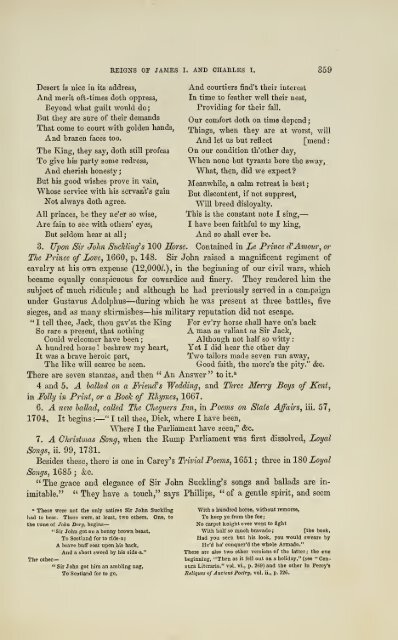Popular music of the olden time. A collection of ancient songs ...
Popular music of the olden time. A collection of ancient songs ...
Popular music of the olden time. A collection of ancient songs ...
Create successful ePaper yourself
Turn your PDF publications into a flip-book with our unique Google optimized e-Paper software.
EEIGNS OF JAMBS I. AND CHARLES I. 359<br />
Desert is nice in its address,<br />
And merit <strong>of</strong>t-<strong>time</strong>s dotli oppress,<br />
Beyond what guilt would do<br />
But <strong>the</strong>y are sure <strong>of</strong> <strong>the</strong>ir demands<br />
That come to court with g<strong>olden</strong> hands,<br />
And brazen faces too.<br />
The King, <strong>the</strong>y say, doth still pr<strong>of</strong>ess<br />
To give his party some redress.<br />
And courtiers find't <strong>the</strong>ir interest<br />
In <strong>time</strong> to fea<strong>the</strong>r well <strong>the</strong>ir nest,<br />
Providing for <strong>the</strong>ir fall.<br />
Our comfort doth on <strong>time</strong> depend<br />
Things, when <strong>the</strong>y are at worst, will<br />
_^ii^ let us but reflect [mend<br />
On our condition th'o<strong>the</strong>r day.<br />
When none but tyrants bore <strong>the</strong> sway.<br />
And cherish honesty What, <strong>the</strong>n, did we expect <br />
But his good wishes prove in vain.<br />
Meanwhile, a calm retreat is best<br />
Whose service with his servant's gain<br />
Not always doth agree.<br />
All princes, be <strong>the</strong>y ne'er so wise.<br />
Are fain to see with o<strong>the</strong>rs' eyes,<br />
But seldom hear at all<br />
^^t discontent, if not supprest.<br />
-yV^ill breed disloyalty.<br />
This is <strong>the</strong> constant note I sing,<br />
I have been faithful to my Mng,<br />
And so shall ever be.<br />
3. Upon Sir John Suckling's 100 Horse. Contained in Le Prince dAmour, or<br />
Tlie Prince <strong>of</strong> Love, 1660, p. 148. Sir John raised a magnificent regiment <strong>of</strong><br />
cavalry at his own expense (12,000/.), in<br />
<strong>the</strong> beginning <strong>of</strong> our civil wars, which<br />
became equally conspicuous for cowardice and finery. They rendered him <strong>the</strong><br />
subject <strong>of</strong> much ridicule ;<br />
and although he had previously served in a campaign<br />
under Gustavus Adolphus—during which he was present at three battles, five<br />
sieges, and as many skirmishes—his military reputation did not escape.<br />
" I tell <strong>the</strong>e, Jack, thou gav'st <strong>the</strong> King For ev'ry horse shall have on's back<br />
So rare a present, that nothing A man as valiant as Sir Jack,<br />
Could welcomer have been ;<br />
Although not half so witty :<br />
A hundred horse ! beshrew my heart. Yet I did hear <strong>the</strong> o<strong>the</strong>r day<br />
It was a brave heroic part.<br />
Two tailors made seven run away.<br />
The like will scarce be seen.<br />
Good faith, <strong>the</strong> more's <strong>the</strong> pity." &c.<br />
There are seven stanzas, and <strong>the</strong>n " An Answer " to it."'<br />
4 and 5. A ballad on a Friend's Wedding, and Three Merry Boys <strong>of</strong> Kent,<br />
in Folly in Print, or a Booh <strong>of</strong> Rhymes, 1667.<br />
6. A new ballad, called The Chequers Inn, in Poems on State Affairs, iii. 57,<br />
1704, It begins :— " I tell <strong>the</strong>e, Dick, where I have been,<br />
\^1iere I <strong>the</strong> Parliament have seen," &c.<br />
7. A Christmas Song, when <strong>the</strong> Rump Parliament was first dissolved, Loyal<br />
Songs, ii. 99, 1731.<br />
Besides <strong>the</strong>se, <strong>the</strong>re is one in Carey's Trivial Poems, 1651 ;<br />
three in 180 Loyal<br />
Songs, 1685 ; &c.<br />
" The grace and elegance <strong>of</strong> Sir John Suckling's <strong>songs</strong> and ballads are inimitable."<br />
" They have a touch," says Phillips, " <strong>of</strong> a gentle spirit, and seem<br />
• These were not <strong>the</strong> only satires Sir John Suckling With a hundred horse, without remorse,<br />
liad to bear. There were, at least, two o<strong>the</strong>rs. One, to To keep ye from <strong>the</strong> foe<br />
<strong>the</strong> tune <strong>of</strong> John Dory, begins—<br />
No carpet knight ever went to flght<br />
"Sir John got on a bonny brown beast, With half so much bravado ;<br />
[<strong>the</strong> book.<br />
To Scotland for to ride-a; Had you seen but his look, you would sweare by<br />
A brave buff coat upon his back,<br />
He'd ha' conquer'd <strong>the</strong> whole Armado."<br />
And a short sword by his side-a." There are also two o<strong>the</strong>r versions <strong>of</strong> <strong>the</strong> latter ;<br />
<strong>the</strong> one<br />
The o<strong>the</strong>r<br />
beginning, "Then as it fell out on a holiday," (see " Cen-<br />
" Sir John got him an ambling nag, sura Literaria," vol. vi., p. 269) and <strong>the</strong> o<strong>the</strong>r in Percy's<br />
To Scotland for to go, Reliques <strong>of</strong> Ancient Poetry, vol. ii., p. 326.

















